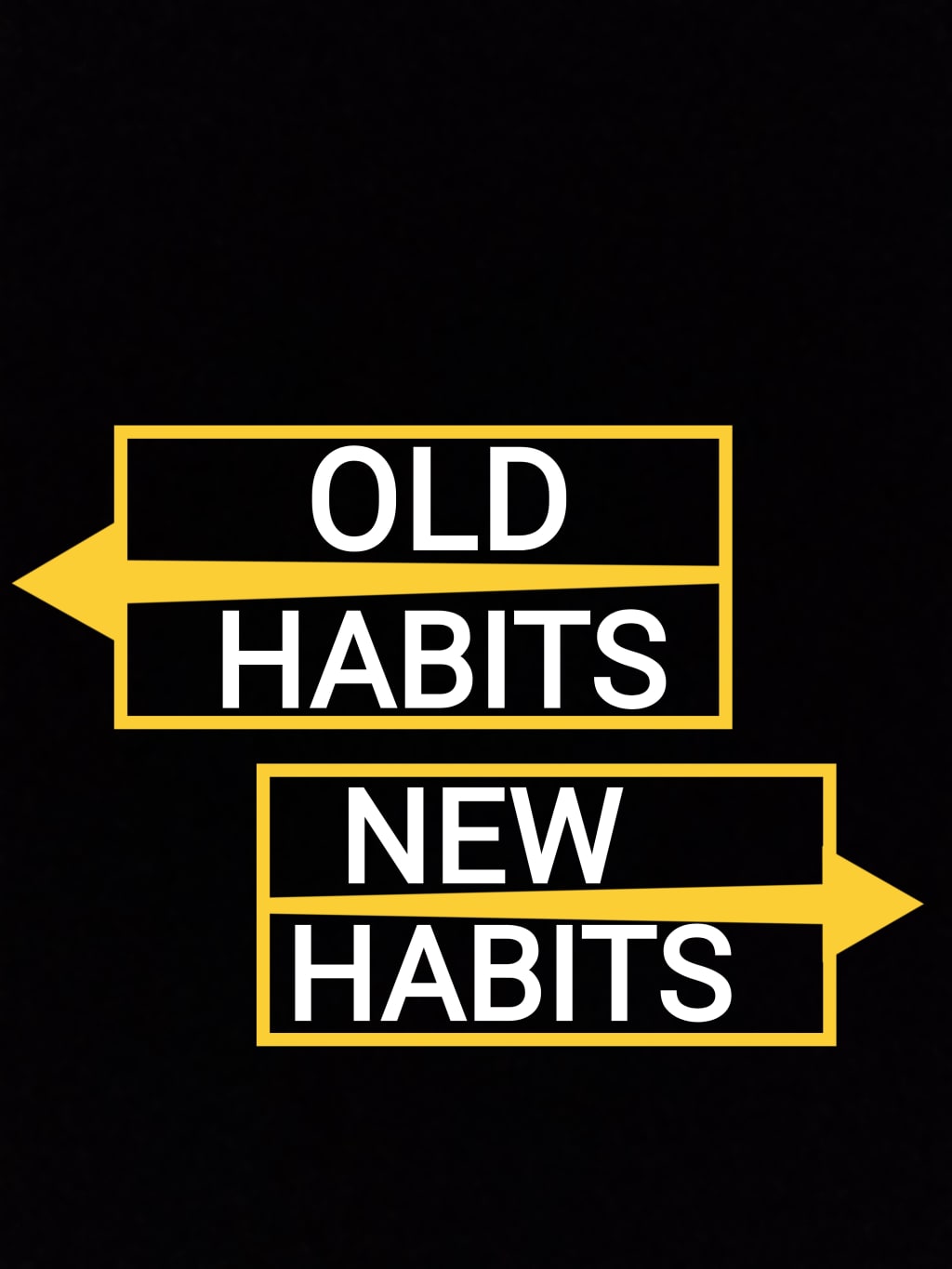SIMPLE WAYS TO BUILD GOOD HABITS & ABANDONED BAD ONES
Old Habits / New Habits

SIMPLE WAYS TO BUILD GOOD HABITS & ABANDONED BAD ONES
INTRODUCTION
NEGATIVE HABITS
Negative behaviors or patterns are those that can be harmful to our physical, mental, or emotional health. Personal development, productivity, and general happiness can all be hampered by these practices.
Here are a few instances of typical bad habits:
Procrastination: Postponing duties or commitments till the very last moment, which causes stress, missing deadlines, and poor job quality.
An unhealthy diet or overeating: Eating unhealthy meals frequently or in excess can lead to weight gain, a lack of energy, and a number of health problems.
Smoking: Consistently smoking cigarettes or using other tobacco products, which can cause addiction, respiratory issues, and an increased chance of life-threatening diseases including lung cancer.
Abuse of alcohol: Drinking alcohol excessively and regularly, which can cause addiction, liver damage, poor judgment, and interpersonal issues.
Biting of nails or other anxious habits: Repeated activities, such as hair-pulling, teeth-grinding, or nail-biting as a reaction to stress or worry, can have a negative effect on one's physical well-being and appearance.
Excessive screen time: is spending too much time in front of displays, such as those on cellphones, laptops, or televisions. This can result in sedentary lifestyles, poor sleep, eye strain, and social isolation.
Negative self-talk is the habitual use of critical or derogatory language about oneself, which can reduce self-esteem, cause stress, and impede progress and achievement on the path to personal growth.
Lack of sleep: These causes fatigue all the time, poor cognitive function, a weakened immune system, and a higher risk of accidents. Sleep deprivation is when sleep is neglected or put off.
Spending too much money or making impulsive purchases: This can result in debt, clutter, and other problems with money and finances.
Constantly monitoring social media: Being overly dependent on social media platforms, continuously checking alerts, and comparing oneself to others can lead to feelings of inadequacy, lower self-esteem, and less productivity.
It's critical to be aware of and accept these harmful routines in order to take action to break them and develop more constructive and advantageous habits.
GOOD HABITS
Good habits should be formed and negative ones should be abandoned in order to advance personally and better oneself. Our everyday routines and our long-term success are both heavily influenced by our habits.
Although developing excellent habits can seem difficult, there are a number of simple techniques that can help make the process more manageable and easier. Similar to this, kicking harmful habits calls both deliberate effort and practical methods.
Here are some pointers to assist you in creating and sustaining good habits:
Small at first: Start with simple, attainable behaviors that you may easily work into your daily schedule. Starting with manageable goals will increase your likelihood of sticking with them and gaining momentum.
Clear your aims: Establish the behaviors that will help you reach your goals. A clear sense of direction and purpose will inspire you to stick with it.
Be consistent: When it comes to creating new habits, consistency is essential. Try to practice your habit daily or on particular days of the week. Over time, maintaining a behavior is made simpler and helps the habit take root.
Make it obvious: Keep symbols of your routines in plain sight. Lay out your gym attire the night before to serve as a visual indication if you wish to exercise in the morning, for instance. This lessens the likelihood of forgetting or skipping the habit and reinforces it.
Find responsibility: Tell someone who can hold you accountable for your habit-building journey, such as a friend, relative, or a support group. They can encourage you, check in with you, and help you keep on course.
Track your development: Keep track of your progress in forming new habits. Mark each day you successfully practice the habit using a habit tracker software, a notepad, or a plain calendar. Observing your development might inspire you and make you feel successful.
Develop a series of behaviors: Combine your new habit with an already -established one. For instance, if you want to make reading a habit, read it right away in the morning or just before you go to sleep at night. Utilize current routines to create new ones with the aid of the habit stacking technique.
Overcome challenges: Develop solutions to get over any potential hurdles that might stand in the way of your habit-building efforts. For instance, if a challenge is a lack of time, get up earlier or set up particular times in your schedule for your habit.
Develop compassion for yourself: Remember to be patient with yourself and that creating new habits takes time. Be kind with yourself if you skip a day or experience setbacks. Instead, put your attention on getting back on track and carrying out the rest of the habit-building process.
Honor achievements: Celebrate your accomplishments along the way by recognizing them. Rewarding yourself can help you stay motivated and reinforce the good behavior, whether you've followed your habit regularly for a week or you've achieved a particular objective.
CONCLUSION
A transforming journey that calls for self-awareness, consistency, and patience is one in which bad habits are broken and good ones are formed. Your chances of success can be increased by defining the habits you want to adopt or break, starting small, and employing positive reinforcement.
Along the journey, you'll face obstacles that you may overcome by comprehending the causes and motives behind harmful habits, changing your environment, substituting good habits for the bad ones, getting assistance, and remaining resilient.
Keep in mind that change takes time and work, so be gentle to yourself and rejoice in each small accomplishment. With perseverance and a positive outlook, you can develop constructive habits and kick bad ones, leading to a happier, healthier, and more meaningful existence.
Becky Hens





Comments
There are no comments for this story
Be the first to respond and start the conversation.